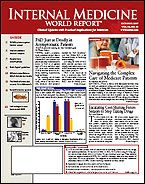Recovery Audit Contractors
By William D. Rogers, MD, FACEP
Dr Rogers is Medical Officer, Office of the Administrator, and Director, Physicians Regulatory Issues Team, Centers for Medicare & Medicaid Services, Department of Health and Human Services.
email:
When President Bush signed the Medicare Modernization Act on December 8, 2003, it changed the Medicare program profoundly. Prescription drug coverage was mandated, several new preventative services were added, and payment for drugs administered in the office was dramatically altered.
The bill was 678 pages long, and among the less-noticed provisions was Section 306.
Section 306, in part, says, "The Secretary shall conduct a demonstration project under this section to demonstrate the use of recovery audit contractors under the Medicare Integrity Program in identifying underpayments and overpayments and recouping overpayments under the Medicare program for services for which payment is made under part A or B of title XVIII of the Social Security Act."
The concept of a "recovery audit contractor" is new, because the Medicare Modernization Act also specified that "payment may be made to such a contractor on a contingent basis." In effect, the audit contractors would be paid on the basis of the amount of Medicare payments that they recovered through audits of charges submitted. The Act further specifies that the contractors need to have "the appropriate clinical knowledge of and experience with the payment rules."
In March 2005, the Recovery Audit Contractors (RAC) were announced. The contractors began by examining Part A claims. They did not start examining physician claims until October 2005.
In November 2006, the Centers for Medicare & Medicaid Services (CMS) released a RAC status report, which found that the RAC process had recovered $54.1 million for the Medicare trust fund and that another $232 million had not yet been collected but had been identified as overpayments. The report also showed that $2.5 million were identified for payment to the providers who had been underpaid (www.cms.hhs.gov/RAC/Downloads/RACStatusDocument--FY2006.pdf).
In December 2006, Congress passed the Tax Relief and Health Care Act, Section 302, which expanded the RAC program to include all 50 states, and made it a permanent program.
Since the implementation of the 3-state demonstration, the Physicians Regulatory Issues Team has heard from a number of physicians who were having problems with the RAC in their state.
The problems have ranged from requests for patient records that were more than 4 years old (a "system fix" was required) to requests for an impractical number of records. We have worked with the RACs to fix the complaints, and have found them to be proactive once they learned of a complaint.
The CMS staff who manage the RAC contracts have been helpful in resolving physician issues and the complaints have helped them write a request for proposal (RFP) for the RAC expansion, which ensures that the new RACs will be more "physician-friendly."
The draft RFP, for instance, requires that the RACs employ an MD or DO as a contractor medical director. We all know how we depend on our local carrier medical directors. Having a doctor in a similar role at the RAC will be of inestimable help. Look for an announcement of another major initiative that will further reduce unnecessary audits and demands.
The RAC concept is here to stay. As a taxpayer, I appreciate the goal of recovering inappropriate Medicare payments. As a physician, I worry about the potential burden it might pose for physicians, from copying reams of patient records to appealing claims when they seem to be wrong about an overpayment.
You should know that we at CMS are aware of these potential problems, and we will work with you and the RACs to ensure that their audits are reasonable and their decisions are well informed.
If you are having problems with an RAC contractor we would like to hear from you. You can e-mail us at .
